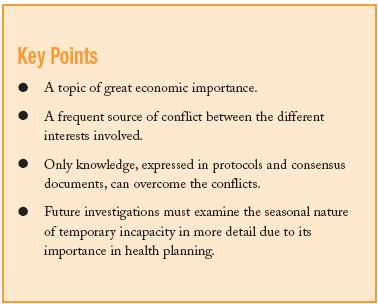Temporary work incapacity (TWI) is defined, in Spain, by the Law 42/94 of the 30th of December on Complement to the Budget, as "that situation where workers are temporarily disabled to work due to a common or professional illness and accident whether or not at work, while they may receive health care of the Social Security, as well as periods of observation for professional disease in those prescribed sick leave from work during the same."1
The question of TWI is of great economic importance. It is calculated that its cost takes up approximately 50% of the annual expense of a primary care team which attends to 18 000 inhabitants,1 or from 1% to 5% of the GDP of a developed country in our environment.2
The subject involves several bodies with conflicting interests: the worker, the Social Security, the company, and the doctor who, as the one responsible to society for evaluating the unfavourable state of health which temporary disables the carrying out of work (which the company loses or has to replace), which gives rise to substitute provision (which the Social Security has to cover), is found in a difficult situation as arbitrator. The diversity of views is reflected in the terminology of naming the worker in the TWI situation, to whom the company normally calls "employee," the Social Security "beneficiary," and the doctor "patient," terms of a very different semantic charge. The diversity of interests (the patient may want to prolong or shorten the sick leave, the company and Social Security wish to limit its duration, the objective of the doctor is that the returning to work may happen when the work is compatible with the clinical state of the patient and its carrying out does not lead to danger of deterioration), and often causes conflicts.
The economic significance of TWI and the presence of conflicts of interest means that the attending doctor has to complete a series of documents to enable it to be monitored, which leads to an added work load. This administrative load contributes to the idea that TWI, although intrinsically being a medical prescription, may often be seen by doctors more like a bureaucratic-administrative act than in its technical-scientific objective.3
In view of the previously mentioned conflicts, reflected in the frequent adjudication of TWI, which could be involved in more than 30% of the claims presented in our country,1 and to optimise its management to reconcile interests and minimise global economic and non-economic costs for all concerned parties, the knowledge of the factors involved, like that contributed by the present article, is of vital importance.
The article examines the factors associated with the duration of TWI episodes and the probability of returning to work in a predominantly rural area.
The factors which were associated with a longer duration were, being female, older, rural address and in the freelance SS, self-employed farm worker or home worker schemes, the summer period, and the diagnosis of mental or circulation system illnesses. There was no relationship between the duration of the TWI and the characteristics of the doctor. The average duration was longer than in other studies, probably due to the higher proportion of rural population and belonging to the farm worker SS scheme, 2 factors which prolong the duration of TWI according to this same study. The effect of the summer season could be due to the lower proportion of sick leave due to lower level of respiratory causes in that period, which corresponds to the minimum annual incidence of influenza, a causing factor to a greater extent of the seasonal nature of TWI.4
The factors which influence the probability of returning to work are the age of the patient (lower the older they are), the Social Security scheme (less if it is a farm worker, freelance or home worker scheme) and the causal illness (less if it is mental or circulatory). Signing off due to medical inspection is associated with a lower probability of returning to work,probably due to being more common in patients with risk factors of not returning to work, as supported by the results of the adjusted analysis, where only the females, with a higher probability of returning to work, maintained a significant effect.
The data presented makes an important contribution to future investigations and the preparation of consensus protocols and documents which could serve as a basis for improving management strategies and, thus limit the bureaucratic load and reduce the level of conflict and adjudication associated with TWI without decreasing patient care. Future investigations should place more emphasis in the design of control strategies (which should not be taken as a criticism of the present article, which could be suitable as a preliminary phase of this task) and in the seasonal natureimportant in the planning of careand its underlying factors.









